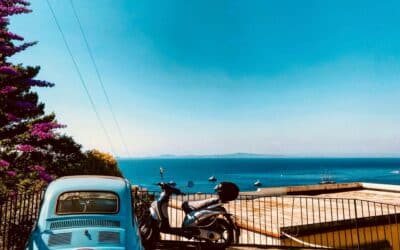The present conditional (condizionale presente) is a verb form that is the equivalent of the English pattern ” would + any verb”, when it’s used to express a wish or possibility. In other words, the conditional is used to express what you would do if, ask something politely, make requests seem less assertive, or make suggestions in a way that is more polite.
For example:
- Viaggerei di più se avessi più tempo libero – I would travel more if I had more free time
- Al posto tuo, cambierei lavoro – In your place, I would change jobs
- Dovresti studiare di più – You should study more
Italian vs. English
While in English the conditional form is expressed by two entities (the auxiliary “would” + verb), the same idea is expressed by only one word in Italian.
For example:
- I would do → Farei
- We would travel → Viaggeremmo
- They would go → Andrebbero
- I would be → Sarei
The regular conjugation of the condizionale presente
| Verb | Italian | English |
|---|---|---|
| Parlare | Io parlerei | I would speak |
| Tu parleresti | You would speak | |
| Lui/Lei parlerebbe | He/She would speak | |
| Noi parleremmo | We would speak | |
| Voi parlereste | You would speak | |
| Loro parlerebbero | They would speak | |
| Avere | Io avrei | I would have |
| Tu avresti | You would have | |
| Lui/Lei avrebbe | He/She would have | |
| Noi avremmo | We would have | |
| Voi avreste | You would have | |
| Loro avrebbero | They would have | |
| Dormire | Io dormirei | I would sleep |
| Tu dormiresti | You would sleep | |
| Lui/Lei dormirebbe | He/She would sleep | |
| Noi dormiremmo | We would sleep | |
| Voi dormireste | You would sleep | |
| Loro dormirebbero | They would sleep |
The irregular conjugation of the present conditional
Common mistakes
One of the most frequent errors I observe in my classes is that students automatically translate the simple form “would” using the verb vorrei. However, the translation of vorrei is “I would like,” not “would.” Vorrei is the only conditional form of the verb “volere.”
- Vorrei → I would like
- Vorrei viaggiare → I would like to travel
- Viaggierei → I would travel
Vorrei, Potrei, Dovrei: 3 very important conditional forms
There are verbs whose conditional forms are very common, which are the conditional forms of the modal verbs volere, potere, and dovere.
The conditional form of volere is
Vorrei, vorresti, vorrebbe, vorremmo, vorreste, vorrebbero
This is a verb that is translated as “I would like, you would like, etc.” or “I wish, you wish, etc..“
It’s also a form to use when we want to make an invitation.
For example:
- Vorresti venire a cena domani? – Would you like to come to dinner tomorrow?
- Vorreste fare un viaggio in Africa con noi? – Would you like to travel to Africa with us?
The conditional form of potere is
Potrei, potresti, potrebbe, potremmo, potreste, potrebbero
This verb is translated as ” I could” or “I would be able“
This form of the conditional is especially used to ask something politely or make a request less assertive.
- Potreste ripetere? – Could you repeat?
- Potresti mandarmi un’ email? – Could you send me an email?
The conditional of dovere, which is
Dovrei, dovresti, dovrebbe, dovremmo, dovreste, dovrebbero
This verb corresponds to the English “I should, you should, etc.” and it’s used especially to give suggestions.
- Dovresti dormire di più – You should sleep more
- Non dovresti mangiare così tanti dolci – You shouldn’t eat so many sweets
All of these verbs are followed by infinitive verbs (non conjugated verbs).
Present conditional in the “if clause”
The present conditional in also used in the “if clauses” together with the subjunctive forms.
For example,
- Se avessi più tempo, studierei di più – If I had more time, I would study more
- Se vivessi al mare, ci andrei tutti i giorni – If I lived by the sea, I would go there every day







